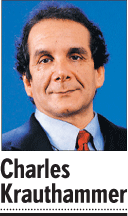Sending Troops Useless If You Refuse
To Win
By CHARLES KRAUTHAMMER
IBDEditorials.com
From the beginning, the call to arms was highly uncertain. On Dec. 1, 2009, commander in chief Barack Obama orders 30,000 more Americans into battle in Afghanistan.
But in the very next sentence, he announces that an American withdrawal will begin after 18 months. Astonishing.
A surge of troops — overall, Obama has tripled our Afghan force — with a declaration not of war but of ambivalence.
Nine months later, Marine Corps Commandant James Conway admitted that this decision was "probably giving our enemy sustenance."
This wasn't conjecture, he insisted, but the stuff of intercepted Taliban communications testifying to their relief that they simply had to wait out the Americans.
What kind of commander in chief sends tens of thousands of troops to war announcing in advance a fixed date for beginning their withdrawal?
One who doesn't have his heart in it. One who doesn't really want to win but is making some kind of political gesture. One who thinks he has to be seen as trying but is preparing the ground — meaning, the political cover — for failure.
Until now, the above was just inference from the president's public rhetoric. No longer. Now we have the private quotes.
Bob Woodward's book, drawing on classified memos and interviews with scores of national security officials, has Obama telling his advisers: "I want an exit strategy."
He tells the country publicly that Afghanistan is a "vital national interest," but he tells his generals that he will not do the kind of patient institution-building that is the very essence of the counterinsurgency strategy that Gens. McChrystal and Petraeus crafted and that he — Obama — adopted.
Party Matters
Moreover, he must find an exit because "I can't lose the whole Democratic Party."
This admission is the most crushing of all.
First, isn't this the party that in two consecutive presidential campaigns — John Kerry's and then Obama's — argued vociferously that Afghanistan is the good war, the right war, the war of necessity, the central front in the war on terror?
Now, after acceding to power and being given charge of that very war, Obama confides that he must retreat lest that very same party abandon him.
What happened in the interim? Did it suddenly develop a faint heart?
Or was the party disingenuous about the Afghan War all along, using it as a convenient club with which to attack George W. Bush over Iraq, while protecting Democrats from the charge of being reflexively anti-war?
Whatever the reason, is it not Obama's job as president and party leader to bring the party with him?
This is the man who made Berlin coo, America swoon and the Nobel committee lose its mind.
Yet he cannot get his own party to follow him on what he insists is a matter of vital national interest? Did he even try?
Obama spent endless hours cajoling and persuading individual members of Congress to garner every last vote for health care reform.
Has he done a fraction of that for Afghanistan — argued, pleaded, horse-traded, twisted even a single arm? And what about persuading the country at large?
Every war is arduous and requires continual presidential explication, inspiration and encouragement. This has been true from Lincoln through FDR through Bush.
Leaving Before Winning?
Since announcing his Afghan surge, Obama's only major speech that featured Afghanistan was an Oval Office address about America leaving Iraq — the Afghan part being sandwiched between that and a long-winded plea for his economic policies.
"He was looking for choices that would limit U.S. involvement and provide a way out," writes Woodward.
One can only conclude that Obama now thinks Afghanistan is a mistake. Maybe he thought so from the very beginning.
More charitably and more likely, he is simply a foreign policy novice who didn't understand what this war was about until being given the authority and duty to conduct it — and then decided it was all a mistake.
Fair enough.
But in that case, what is he doing escalating it?
Sen. Kerry, now chairman of the Foreign Relations Committee, once asked many years ago: "How do you ask a man to be the last man to die for a mistake?"
Perhaps Kerry should ask that of Obama. "He is out of Afghanistan psychologically," says Woodward of Obama.
Well, he may be out, but the soldiers he ordered to Afghanistan are in.
Some will not come home.
